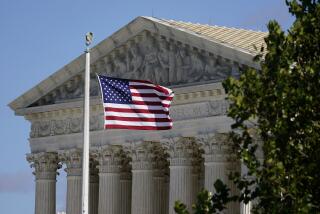Justices May Limit Investor Suits
- Share via
U.S. Supreme Court justices signaled that they might limit investor suits against securities firms, aiming a barrage of questions at a lawyer seeking to sue Merrill Lynch & Co. on a claim that it issued deceptive research reports.
In a one-hour argument session in Washington on Wednesday, several justices suggested that they read a 1998 federal law as barring large class-action suits by investors who say they were duped into holding on to securities they might otherwise have sold.
Chief Justice John Roberts questioned the rationale behind so-called holder lawsuits, saying they claimed that the investors should have been allowed to sell their shares at artificially inflated prices.
“What your clients want to do is cash in on the fraud,” Roberts told David Frederick, the lawyer for a former Merrill Lynch broker who says he lost money on his personal account when the firm’s analysts gave glowing recommendations to stocks they disparaged in private.
New York-based Merrill Lynch, the world’s biggest securities firm by market value, agreed to pay a $100-million fine in 2002 to settle claims by New York Atty. Gen. Eliot Spitzer that the firm’s research misled investors.
Frederick said the 1998 Securities Litigation Uniform Standards Act affected only class-action suits by purchasers and sellers of securities, not those by people who simply hold investments. He said Congress had no intention of blocking suits by long-term shareholders from going forward in state court.
“It was not designed to eliminate state remedies that could not be pursued” as federal claims, Frederick argued.
The 1998 law requires class-action suits “in connection with the purchase or sale of a covered security” to be filed under federal law, which bars punitive damages and requires higher levels of proof than many state laws.
More to Read
Sign up for Essential California
The most important California stories and recommendations in your inbox every morning.
You may occasionally receive promotional content from the Los Angeles Times.













